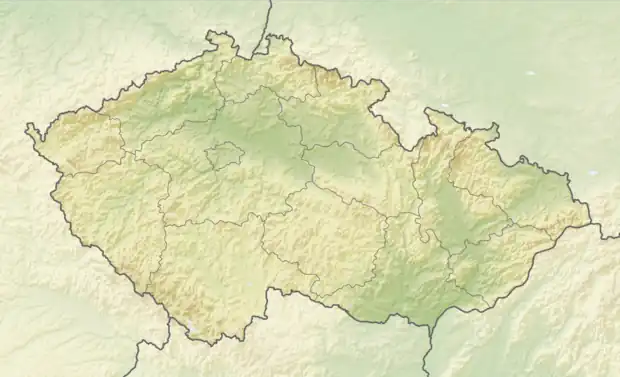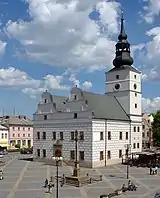Lanškroun | |
|---|---|
 J. M. Marků Square | |
 Flag  Coat of arms | |
 Lanškroun Location in the Czech Republic | |
| Coordinates: 49°54′44″N 16°36′44″E / 49.91222°N 16.61222°E | |
| Country | |
| Region | Pardubice |
| District | Ústí nad Orlicí |
| First mentioned | 1285 |
| Government | |
| • Mayor | Radim Vetchý |
| Area | |
| • Total | 20.65 km2 (7.97 sq mi) |
| Elevation | 373 m (1,224 ft) |
| Population (2023-01-01)[1] | |
| • Total | 9,709 |
| • Density | 470/km2 (1,200/sq mi) |
| Time zone | UTC+1 (CET) |
| • Summer (DST) | UTC+2 (CEST) |
| Postal code | 563 01 |
| Website | www |
Lanškroun (Czech pronunciation: [ˈlanʃkroun]; German: Landskron) is a town in Ústí nad Orlicí District in the Pardubice Region of the Czech Republic. It has about 9,300 inhabitants. It lies on the border of the historical lands of Bohemia and Moravia. The historic town centre is well preserved and is protected by law as an urban monument zone.
Administrative parts
Lanškroun is made up of town parts of Dolní Třešňovec, Lanškroun-Vnitřní Město, Ostrovské Předměstí and Žichlínské Předměstí.
Etymology
The original historic name of Lanškroun was Landeskrone, meaning "Land's crown". It referred to its location on the border of the historical lands of Bohemia and Moravia.[2]
Geography
Lanškroun is located about 10 kilometres (6 mi) northeast of Ústí nad Orlicí and 50 km (31 mi) east of Pardubice. It lies in the Orlické Foothills. The highest point is at 449 m (1,473 ft) above sea level.
The Třešňovský Stream flows through the town. In the northwestern part of the municipal territory is a set of six ponds on the Ostrovský Stream. The largest of them is Dlouhý, used for recreational purposes and water sports. The northernmost ponds Pšeničkův and Olšový and the area around the Zadní Stream before its confluence with Ostrovský Stream are protected as a nature reserve within the Lanškroun Ponds Nature Park.
History

The first written mention of Lanškroun is from 1285, when it was donated by King Wenceslaus II to Záviš of Falkenstein. Lanškroun was founded during the colonization in the second half of the 13th century under the name Landeskrone. It became the economical centre of the large estate of Lanšperk and later of separate Lanškroun estate.[3]
In 1304, Lanškroun property of the Zbraslav Monastery and in 1358, it was acquired by Roman Catholic Diocese of Leitomischl. In 1371, an Augustinian monastery was founded. In 1421, the town was conquered by Jan Žižka. After the Hussite Wars, the estate was acquired by the noble family of Kostka of Postupice. It began to prosper and obtained various privileges. In 1507, it was bought by the Pernštejn family. Then it was shortly held by the Hrzáns of Harasov, and after the Battle of White Mountain, it was bought by the Liechtenstein family.[3][4]
During the Thirty Years' War, the town was repeatedly burned down and looted by the Swedish army and the catholicization began. After the war, the population was significantly decreased. It was repopulated by German settlers and in 1683, German has become the official language.[4]
During the 18th century, Lanškroun was an average serf town. In 1848, the serfdom was abolished and Lanškroun became a district town. In the 1870s, the industrialization began. The railway was built in 1884–1885.[4]
Until 1918, the town was part of Austria-Hungary as the seat of the district Landskron in Bömen, one of the 94 Bezirkshauptmannschaften in Bohemia.[5] After 1919 it became part of Czechoslovakia. In 1938 it was occupied by German troops as the Protectorate of Bohemia and Moravia, according to the Munich Agreement.
Until the expulsion of the German speaking population from Lanškroun in 1946, the majority of population of the town had been German. After the expulsion, the town became completely Czech. In 1945, it ceased to be a district town.[4]
Demographics
|
|
| ||||||||||||||||||||||||||||||||||||||||||||||||||||||
| Source: Censuses[6][7] | ||||||||||||||||||||||||||||||||||||||||||||||||||||||||
Economy
Lanškroun is an industrial town. The most important sectors are the electronics industry, engineering and paper industry.[2] The largest employers are Kyocera AVX Component and Schott CR (both manufacturers of electronic components), and Schaeffler Production CZ (manufacturer of rolling element bearings).[8]
Transport
Lanškroun is the terminus of a short local railway line heading from Česká Třebová.[9]
Sights

Lanškroun is known for its large Renaissance town hall, which is one of the symbols of the town. It was built in 1581–1582. The two original Renaissance portals are preserved.[10]
The original monastery from the 14th century was rebuilt into a Renaissance castle. The reconstruction was completed in 1601. From the 1650s to 1716, it was rebuilt to its current appearance. Today it houses the town museum.[11] The Church of Saint Wenceslaus is adjacent to the castle and stood here before the founding of the monastery. It was first mentioned in 1350 and originally was consecrated to the Virgin Mary. It was reconstructed several times; the tower was added in 1768.[12]
Notable people
- Jan Marek Marci (1595–1667), physician and scientist
- Josef Johann Steinmann (1779–1833), Austrian pharmacist and chemist
- Friedrich Gustav Piffl (1864–1932), Cardinal and Archbishop of Vienna
- Herwig Schopper (born 1924), Czech-German experimental physicist
- Jan Smejkal (born 1946), chess player
- Jan Ambrož (born 1954), chess player
- Ludmila Müllerová (born 1954), politician
- Robert Dušek (born 1967), politician
- Roman Šebrle (born 1974), decathlete, Olympic winner
Twin towns – sister cities
Lanškroun is twinned with:[13]
 Castiglione in Teverina, Italy
Castiglione in Teverina, Italy Dzierżoniów, Poland
Dzierżoniów, Poland Hajdúszoboszló, Hungary
Hajdúszoboszló, Hungary Kežmarok, Slovakia
Kežmarok, Slovakia Serock, Poland
Serock, Poland
References
- ↑ "Population of Municipalities – 1 January 2023". Czech Statistical Office. 2023-05-23.
- 1 2 "O městě Lanškroun" (in Czech). Město Lanškroun. Retrieved 2023-05-16.
- 1 2 "Stručná historie Lanškrouna" (in Czech). Město Lanškroun. Retrieved 2021-10-07.
- 1 2 3 4 "Dějiny města" (in Czech). Město Lanškroun. Retrieved 2021-10-07.
- ↑ Die postalischen Abstempelungen auf den österreichischen Postwertzeichen-Ausgaben 1867, 1883 und 1890, Wilhelm Klein, 1967
- ↑ "Historický lexikon obcí České republiky 1869–2011 – Okres Ústí nad Orlicí" (in Czech). Czech Statistical Office. 2015-12-21. pp. 7–8.
- ↑ "Population Census 2021: Population by sex". Public Database. Czech Statistical Office. 2021-03-27.
- ↑ "Registr ekonomických subjektů". Business Register (in Czech). Czech Statistical Office. Retrieved 2023-05-16.
- ↑ "Detail stanice Lanškroun" (in Czech). České dráhy. Retrieved 2023-06-28.
- ↑ "Partnerská města" (in Czech). Město Lanškroun. Retrieved 2021-10-07.
- ↑ "Lanškrounský zámek" (in Czech). Město Lanškroun. Retrieved 2021-10-07.
- ↑ "Kostel sv. Václava" (in Czech). Město Lanškroun. Retrieved 2021-10-07.
- ↑ "Partnerská města" (in Czech). Město Lanškroun. Retrieved 2023-05-16.